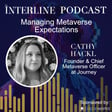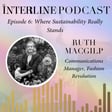Become a Creator today!Start creating today - Share your story with the world!
Start for free
00:00:00
00:00:01

The Foundations Of Metaverse Fashion
Ben Hanson talks to Marjorie Hernandez (Founder at LUKSO, and Co-Founder at The Dematerialised) about testing the possibility space of digital fashion, and about the core mechanics of digital ownership and decentralisation.
This episode is sponsored by Informa Markets and SOURCING at MAGIC. Register to attend for the next stage in this discussion, and to see The Interline and the SOURCING at MAGIC teams showcase fashion technology in action in the all-new SOURCE Lounge, August 7th through 10th 2022: https://www.sourcingatmagic.com/en/home.html
Explore our past collaboration with LUKSO: https://www.theinterline.com/11/2020/staking-your-claim-in-the-new-digital-economy/
Transcript
Market Trends: 4G Products vs Physical Goods
00:00:01
Speaker
I think percentage wise it's very likely that the market share of 4G user products is substantially larger and bigger than the market share for physical products. I think that's a future that is unavoidable and we know it just like you know 30 years ago all of the biggest companies in the world were all oil companies and today all the biggest companies in the world are
Episode Introduction: Metaverse Fashion Foundations
00:00:24
Speaker
Welcome to the Interline Podcast. This is episode 4, and we're here to talk about the foundations of the Metaverse fashion. There's a lot of Metaverse content out there approaching the subject from a lot of different angles, and some of them are frankly pretty dubious.
Dubious Metaverse Content & Partnerships
00:00:36
Speaker
You might have seen that we recently kickstarted a new series of articles written by the Digital Fashion Group as part of a new content partnership, and those are targeted at making sense of the Metaverse.
00:00:46
Speaker
And that's part of an overall trend because there's a strong inclination out there right now for people to treat the metaverse as something that's finished and ready to
Commercial Opportunities in the Metaverse
00:00:55
Speaker
go. Something we all implicitly agree the shape of. Something that's framed as being a commercial opportunity first and a cultural upheaval second. I don't think any of that's the case, but luckily there does also seem to be a growing realization in the industry that with the initial hype wave dying down,
00:01:13
Speaker
The task has turned to asking and answering some hard questions and to recognising that there are multiple new business models to be made, but they're going to need to be made on a more realistic timeline.
Guest Introduction: Marjorie Hernandez of Luxo
00:01:24
Speaker
To tackle some of those hard questions, I have one guest for the show, Marjorie Hernandez.
00:01:29
Speaker
Marjorie is the founder of Luxo, which is billed as an open and interoperable blueprint for digital and digital worlds. The Interline and Luxo collaborated on a manifesto for how brands can stake their claim in the new digital economy back in 2020. And things have moved quickly in this space, and the word metaverse wasn't as prominent in the public consciousness when we wrote that piece as it is today. But there's still a lot that's relevant in there, so you'll find a link to that piece in this episode's description.
00:01:55
Speaker
Marjorie is also a co-founder of the Dematerialized, a web3 marketplace for authenticated virtual goods, and a platform for nurturing the emerging digital fashion ecosystem. All of which gives her a unique perspective on not just the possibility space of digital fashion, but some of the core mechanics of digital ownership and decentralization.
00:02:16
Speaker
We're going to be tackling both of those topics in this episode. But first, some exciting news.
Sponsorship & Tech Events at Magic Las Vegas
00:02:21
Speaker
This episode of the Interline Podcast is sponsored by Informer Markets Fashion and Sourcing at Magic, the milestone fashion sourcing event that's been a fixture in the calendars of international brands, manufacturers, suppliers, and service providers for years.
00:02:35
Speaker
This August, 7th through 10th, the Interline is extremely proud to be partnering with the team behind Sourcing It Magic to extend the technology footprint of its Las Vegas show, bringing vital fashion industry discussions like the one you'll hear in this episode to life, along with a wider program of tech-focused talks, topic breakdowns, and demonstrations by technology exhibitors.
00:02:53
Speaker
That's all going to be collected in a new tech-first community called the Source Lounge. It'll all be free to attend for anyone who's already going to Sourcing at Magic, and I'm going to be personally curating and hosting all the sessions, so they're guaranteed to be your kind of content if you're already a fan of the Interline, and especially if you enjoy this episode.
00:03:09
Speaker
You can find out more and register to attend or exhibit at www.sourcingatmagic.com. We'll also be recording a special episode of the podcast at the event, so even if you can't make it, that should help it feel as though you're there. I'm really excited to be partnering with Sourcing at Magic for the show in a few weeks time, as well as for future and former markets fashion events in North America.
Technological Impact on Fashion Roles
00:03:32
Speaker
Like everyone here at The Interline, they believe that everyone who works in fashion will have their role touched by technology in the near future. And like us,
00:03:39
Speaker
They believe it's important to make sure everyone's informed about how to make technology work for them. So come and see Fashion Technology in action this August 7th through 10th at the Las Vegas Convention Center and check out the new editorial collaboration between the Interline and the Sociate Magic team live on the website now. Now back to my discussion with Marjorie.
Foundations of the Metaverse: Ownership & Interoperability
00:04:00
Speaker
Padre, it's kind of difficult to avoid the word metaverse at the moment because everyone has their own slant on what that means. Everyone's got their own vision for what that describes. I'd like to get your perspective on some of the more foundational bits of that, you know, digital ownership, interoperability, the ability to sort of verifiably own a digital garment and then to use it wherever you like in one or more metaverses, if that's the way things go. That's also kind of one of the core building blocks of any
00:04:28
Speaker
Long-term view for digital interactive fashion and it but it's also kind of one of the pieces that people seem keen to sort of hand wave away as being a concern for the future people seem very keen to run at the idea that, okay, we're targeting the metaverse will figure out what it means to actually verifiably own something and move it around and port it afterwards.
00:04:48
Speaker
What's your perspective on that
Transition to a New Web Iteration: Long-term Implications
00:04:51
Speaker
way of thinking? What's your perspective on how far that vision for digital ownership is being realised today? And what's currently missing from that picture?
00:05:00
Speaker
The point where I would like to start is that we are just at the beginning of a step in between two versions of, let's call it the web for now.
Unified Metaverse Experience
00:05:15
Speaker
We're just in the beginning of the next iteration and what that means and what that will mean long-term
00:05:23
Speaker
is yet to be defined. I think we all collectively, all of us who are working in this space have a sense of the direction that it's going to take. So in my personal opinion, I think number one, there's not such a thing as meta-versus, just in the same way we don't have internetsis, we have potentially it's going to, I think the definition of the metaverse is to one place and not because it's going to be one place of experience, but because what constitutes the metaverse
00:05:52
Speaker
is all of those different pieces coming together. So I think there's a heavily mixed use of the word metaverse in which you could create some kind of confusion for things that we already know since a very long time, like games.
00:06:06
Speaker
Like games exist for a very long time. So the metaverse is not a game, but games are part of the metaverse.
Technology Blending Digital & Physical Realities
00:06:14
Speaker
So I think all of those things coming together constitute the next iteration of the web. And that implies a real juxtaposition between the digital reality and the physical reality. And then that juxtaposition that is being created by the advance of technology
00:06:33
Speaker
between computer graphics and bandwidth and all of those things coming together to really allow for a juxtaposition and the fact that we are going to be constantly immersed in the next iteration of devices that we're going to have.
00:06:45
Speaker
which obviously is going to be way more sophisticated than our current smartphones. I want to allow for a full immersion. The parts that are really important to go back to your question is definitely in terms of ownership, if we are spending even more and more time or our reality is truly juxtaposed with the reality.
00:07:07
Speaker
Then things like our ownership, our identity, our assets, the way we're spending our money and our time has to be fundamentally modified. I think the current business model of the web was kind of like a byproduct in kind of like an effort to try to monetize the internet because there was no clear business model from the get
Importance of Independent Digital Asset Ownership
00:07:30
Speaker
-go. So all of this sort of advertisement and user data became the business model.
00:07:34
Speaker
And I think that was fine. We got a lot of services for free. That was a between stepping stone. But now we have to move ahead. And then in that process of moving ahead, there is a fact that we need to own our profiles. We need to own our entity. We need to be able, once we buy an asset, we should own it. And it should not be on control of the provider of the asset. And then that asset should be able or should in all cases
00:07:59
Speaker
grant us access to all different spaces of experience. So I think when people nowadays say I'm building a metaverse, I think what they mean is that you're just building a place for experience, right? Which is primarily digital. So that might be some kind of like gamified experience that might be something like a layer within social media, things like that. So I think, you know, in that part of notifying, there's a lot of like, technological pieces that need to be
00:08:26
Speaker
build and construct and then in terms of our community people need to start coming together and agreeing what are the pieces that make the most sense and then keeping an eye and being very cautious in terms like centralization in this case it is truly truly dangerous because still today most of us we make a living or we exist within without the access for like that has
00:08:53
Speaker
not too much impact in our livelihood if we have or have no access to digital technologies. Of course, it is better, but if you're an influencer or a content creator, things like that, your livelihood is really depending on your access to these platforms. These platforms as privately owned companies, they have the ability to
Risks of Centralized Digital Identities
00:09:13
Speaker
black list, white list, stop people from accessing, cancel you or whatever it is, the name they were given it. So there is a danger that comes attached to that. If your main occupation, if your livelihood is attached to the ability of entering a space, your ability of selling your assets, your products, of having your identity as a creator existing in a digital environment, then we have to make sure that those things do not exist within a centralized system that is controlled
00:09:40
Speaker
by incentives of a group of shareholders. I think in that term, it represents a very big change. I absolutely agree with that. I think it also makes you subject to the whims of platform owners as well. It's important to realize that if you've ever been a YouTube creator, you've ever been
Opportunities in Digital Fashion for Brands
00:10:02
Speaker
you've ever developed a video game, you've been beholden to the whims of publishers or platform owners, any of those kinds of things. Those things are subject to change based on, like you said, commercial factors, commercial drivers, they're subject to change based on a whole bunch of other different factors which are outside
00:10:19
Speaker
the individual creators control. And looking at it through a fashion lens from that point of view, how many designers before have said, I wish I could sidestep the existing system, I wish I could sidestep the existing supply chain, I wish I could sidestep some of these existing models. There's an opportunity here to create a new way of thinking that sort of realises that.
00:10:42
Speaker
I'd like to talk a bit about blockchains and specifically NFTs for a minute, because I think almost everybody would agree that there's still considerable barriers to entry for consumers.
Blockchain Usability Challenges
00:10:53
Speaker
We've just talked about interoperability, portability, the importance of owning something independent of platform owners, but I'm thinking more here at the user experience level where you have software wallets and distributed apps that currently clash with
00:11:09
Speaker
what the average shopper is going to expect in terms of usability. Is there like, for want of a better word, is there a way for blockchain applications to become more approachable in a way that's going to increase the chances of end user adoption?
00:11:23
Speaker
Yes, 100%. And I think that goes back to being part of the beginning of that journey, that in terms of blockchain technology, even though we are now over 10 years within the game, it still is all very early stage. And I think it's just a matter of time, just like we experienced with Web1 and Web2, it's just a matter of time until interfaces, applications, user journeys
Improving User Experience with Blockchain
00:11:45
Speaker
become
00:11:45
Speaker
Better and friendlier and at this point in time, we know nobody known of us internet users are discussing things like TCP IP Like this is not part of our conversation anymore. So I think you know as technology evolves things
00:12:01
Speaker
thankfully start becoming invisible because technology becomes beautiful. So we can stop preoccupying about certain things. So I think it's just a matter of time until this process has become better. And that's something that at Luxor, the reason why Fabian and I started Luxor is because truly we wanted to have an impact and an influence about how users are interacting with the blockchain and how the user journeys come.
00:12:25
Speaker
constitute and design and by no means compromising decentralization, right? Because I think right now what we have is we have a series of applications that potentially for the sake of simplifying the journey they're sacrificing in
00:12:42
Speaker
in decentralized station, so it becomes slightly more centralized systems. So I think we have to find a way in which users can still have that autonomy and authority, all of those beautiful things production technology can provide, but at the same time having a very easy user journey. The reason why right now user journeys are broken is because you have a very specific group of people developing the technology. At the beginning you have
00:13:07
Speaker
very hardcore C++, co-developers, cryptographers developing the technology, and Po-Po, we're evolving to having more web developers coming in, and more product people like myself coming in, and then truly coming in with a user-centric perspective.
Invisibility of Technological Complexities
00:13:23
Speaker
And I think it's just a matter of time to be simplified, right? But most things that we're interacting in a regular basis are quite complex. But we as users, we are kind of like unaware of the complexity that stands behind it. And at this point in time, unfortunately, because the user journeys are broken,
00:13:41
Speaker
We need to be like those facilitators for ourselves as users. So I think those values of entry were lower, you know, at log. So we are doing a lot, a lot of work around conflict, how user profiles and we call it the universal profile works for an user on chain, how assets are being created, how to truly create those standards and interfaces for creators and users so they can interact with the blockchain on a very simple fashion.
00:14:04
Speaker
So I think things like that obviously will simplify and also obviously with the beautiful thing with blockchain technologies, obviously there's always this part of we have this ability of having this internet of value that we always talk about. So we have this very thin line that we are like between technology and regulation of financial instruments simultaneously, right?
00:14:26
Speaker
So, for certain things where you, for example, will require lips or e or Bitcoin and things like that in order to operate with the system, then you enter a process that is like a financial process in which you need to do KYCs and things like that. So, I think just like everything eventually will become a service and will be productized. We will have people providing for relay or services in which they will start paying. You will pay a subscription and then this provider is paying for your transaction fees and things like that.
00:14:56
Speaker
So we will start having services built on top that will simplify the journey.
Simplifying Blockchain for Users
00:15:00
Speaker
But it's just a matter of timing. And I think we shouldn't be intimidated by it. And we just continue to move forward and making sure that we are building better and more attractive applications.
00:15:12
Speaker
there's a need for people to accept like a layer of abstraction between the fundamentals of something and the experience of using something like as somebody who grew up messing around with like you said TCP IP somebody who grew up messing around with subnet masks and stuff like that I'm very glad I don't have to do that anymore I'm very glad I can just connect to a Wi-Fi network and things work out fine and at no point do I feel as though I've necessarily
00:15:36
Speaker
lost control of what's underneath it. It's more a case of what portions of it do I actually need to interact with to get done what I need to get done. And I think the same is going to apply for the end user experiences here. It's a question of maturity, sure, but it's a question of how that maturity places those sort of layers of abstraction service layers between the technology and between the experience.
00:15:59
Speaker
Yeah, 100%. And I think, you know, as we, I mean, we remember the beginnings of the web, like when the web, I mean, we do, not everybody, but some of us do. And there was this point where people were asking you, but what is it? And what do you do in it? But how does it work? And it's very complex. I mean, the web is not any, you know, it's not by no means like an easier technology, right?
00:16:25
Speaker
It's not that it became easier. It's just that people stop being interested. All of a sudden, the value proposition was proven. What I can do is pretty straightforward. How the whole infrastructure behind it works, very few people really know it. I think when a new technology comes around, there's this necessity to understand what is it. If I can't really use it, and it's not very clear, I at least want to understand it. I think this is like
00:16:53
Speaker
how the dichotomy in a way that we are finding ourselves. So I think as applications become better, as the value proposition is indisputable for users, then that extreme necessity of understanding what's happening in the background will decrease.
Value Propositions Over Technical Understanding
00:17:07
Speaker
Not that I'm saying human curiosity should be shut down, but I think it's just in terms of when we have an amazing application that we can utilize is way better than we now trying to become cryptographers in a free time.
00:17:22
Speaker
It's very similar to the paradigm you have in a lot of end user applications where you have pro users slash power users and you have regular users. And where you're at with, or where a lot of blockchain is at, is very much on the power user, pro user side at the minute. And what was moving towards is more of that average user accessibility.
00:17:45
Speaker
And that brings us to a similar question, but from the brand's perspective. So based on the conversations that I've had, what we've had with brands recently, there's sort of a universal understanding of some of the potential benefits of blockchain backed NFT backed digital fashion, but a lot less in the way of a kind of roadmap that allows a brand to actually achieve those benefits.
00:18:07
Speaker
Whether they're talking about selling digital fashion, targeting the secondary market or overhauling the supply chain relationships with smart contracts. In your experience, where are brands encountering barriers to blockchain adoption and what can be done about those barriers?
Challenges for Traditional Brands in Digital Spaces
00:18:25
Speaker
I think for brands entering the space, there is no barriers. There's nothing stopping them. I think there are challenges in terms of if you are a traditional
00:18:37
Speaker
brand I think you have comparatively a disadvantage based on the fact that you have all of these established processes and products and stuff and your supply chain and everything that you do in the physical world. It's almost I almost feel like it's extra weight at certain points in terms of moving into this space but there's nothing really stopping it and I think the challenge is number one well you have an existing business model that you know is the one that
00:19:05
Speaker
so far has worked, but eventually you might have to deprioritize in order to prioritize something else. But that's kind of like very long term. That's very similar to, I don't know, like the automotive industry, how easy, or let's say easier, is for a company like Tesla, any of those companies too.
00:19:24
Speaker
fully start a completely new process of just manufacturing electric cars versus an existing company like Mercedes Benz to now fully transform their supply chain to now just produce electric cars. There's a challenge that's bigger for them than it is for a completely new company. A new company is more agile.
00:19:44
Speaker
I think for existing fashion companies, there is a challenge that they already have a business model that is to the world that we're heading, it potentially is outdated. These potential human resources, financial interest and all of that continue to push in that direction, whereas they need to really put attention where the world is actually heading. I think that's kind of like
00:20:06
Speaker
I would say challenge number one.
Translating Brand Value Propositions to Digital
00:20:08
Speaker
Then what I would say as a brand, if I would be an existing fashion brand, my main concern would be
00:20:16
Speaker
does my brand has a value proposition that translates into a material brand? And if that's so, what it is? And will my brand at all translate, right? Because a lot of the value propositions of these brands have nothing to do. It's very attached to the physical world. So it's a question, will it translate? And then if it translates, then I think it's a matter of executing the strategy. So it's done properly. And then attracting the right talent. I think we're living in a point in time where
00:20:45
Speaker
talent, it is scarce. People who understand the space, who understand the culture are limited. And there is a question if those people are incentivized to work for a brand or start building something for their own. And I will argue they should build their own. So I think there's a series of challenges in that, but that's more like from a different perspective. From a technology perspective, there is no challenges. There's some difficulties in terms of like onboarding your existing user to a new
00:21:12
Speaker
that is very not friendly for a regular consumer, but there's a lot of companies such as Luxo and the Materialize and many companies out there working on making that easier to onboard your users. I think another challenge might be that in the process of translating the brand, you seem inauthentic to your current user.
00:21:34
Speaker
So I think there's a lot of challenges that need to be navigated. I personally see from a technology perspective, I don't see challenges because I think the technology is out there already. It is not ready, very ready. It's not like a plug and play, but all of the pieces of the puzzle are there and then you just need the right thing to put them together.
00:21:54
Speaker
Let's talk a little bit about digital identities. We all have them. And even though the bulk of this sort of pandemic era disruption to travel work is hopefully over, we're also all more tied to digital methods of interaction and expression than
Control Over Digital Identities
00:22:09
Speaker
ever before. I mean, you and I are not recording this episode in the same room. We're recording this virtually. But on the flip side, there's a lot of deep concerns out there around how much of our digital identities we actually own and control, whether we're talking about
00:22:23
Speaker
persistent identities for the metaverse or less ephemeral things like data privacy and security. What role do you think self-sovereign, so cell phones, self-governed digital identities have to play in that in the near future and what does it look like to actually put that into practice?
00:22:40
Speaker
Well, I think as we continue to progress in this journey that we have embarked as a collective and as a society in terms of there is a significant part of our lives that has been dematerialized and it's how we understand value and assets and products or services. It's fundamentally different than what it meant for generations prior to ours.
00:23:08
Speaker
There is a bigger question around what does it mean to have an identity in a world? And so far, we always understand identities in terms like our state-given birthright identity, which is governed by the rules of our state. And it has very specific functions that allow us to operate in the world. But we do do a lot of things and a lot of activities that are unrelated. If we exist in a world that is a government at no stake, then the metaverse, it is and it should be.
00:23:36
Speaker
and continue to be government agnostic and not be, you know, controlled by the dynamics of geopolitics. So in that place, we do need an identity that is not related to our state-giving identity. It's a completely new identity. There is a soft identity in me as a gamer, as an entrepreneur, as a creator, as somebody who studies architecture. I have many facets of my life and I might have
00:24:01
Speaker
several identities in the metaverse to express my, my different interests in different ways and create my identities in different ways, but those identities are all me. Right. And at all times, those identities should be under my control. Unfortunately, in the physical world, I am
00:24:17
Speaker
limited by the things that were given to me based on the place of my birth or when my parents were born or whatever it might be and my gender and all of that stuff. There's a lot of limitations and boxes we've been put as humans, but we have now this opportunity of this new realm that we're building in which we can actually be and express all of the interest that we have outside of certain restrictions we might be facing in the physical world.
00:24:44
Speaker
So I think that identity and those identities, we would be using them way more than we do our passports, hopefully. And it's very, very important for us to be in control of them. And I think, you know, in the past, when we started Luxor, we used to joke Fabian and I that we are solving problems that people don't know they have
Issues of Control and Identity on Platforms
00:25:01
Speaker
yet. I think users are working to the realization that there's a true problem with centralization.
00:25:06
Speaker
especially when most of the activities that you realize online can be taken away from you. Like Google, Meta, all of the services can lock us out. And that's a very, very difficult thing to accept, but it's the truth. So I think we realize we need to move away from it, we need to control, we need to be sovereign, we need to be in control of our identity.
00:25:27
Speaker
Not saying they won't be monetized, but at least you have to agree to the monetization. We understand also that by the systems getting to know us, there might be a benefit in terms of your music algorithm, knowing what you like and discovering things for you. It's a very nice experience, but you should be in control and understanding what is the trade-off.
00:25:47
Speaker
And I think as users, once we become aware of what is a trade-off, then those trade-offs might be OK. We can decide if we're accepting or not. But it's a matter of we're accepting them. So understanding that one of the most key parts of our existence moving forward, it would be the ability of controlling our digital identity is part of mouth. I think that's interesting from a brand's perspective, though, because that does imply an evolution in the way that brands think about engagement with their
Self-sovereign Identities & Brand Engagement
00:26:17
Speaker
consumers and engagement with the people who engage in return with them because currently that's very much sort of a one-way street where the brand is trying to
00:26:27
Speaker
bring in customers and maximise the lifetime value of those customers by selling them progressive products over time based on what they like. And currently the assumption there is that you are within sort of GDPR regulations and everything else. You're opening yourself up as a consumer to being marketed at and to having your data used to roll into things like, to look at this through a fashion lens, to roll into things like planning of the next cycle of products, planning a future collection based on demographic data, all those kinds of things.
00:26:55
Speaker
I think the fundamental difference, if I understand it correctly, is that self-sovereign identities are more a case of having to explicitly grant that permission and having to explicitly opt in to be part of that cycle because you find it valuable. That shifts the onus a little bit towards the brands demonstrating that they can provide that sort of value. That value can come in a ton of different forms and a ton of different types of experiences.
00:27:22
Speaker
I think that's the sort of switch that you're talking about is from kind of implied implicit value towards more explicit and optional opt-in value for the consumer. 100%.
00:27:37
Speaker
The fashion industry has been physical only for centuries,
Digital vs Physical Business Models
00:27:40
Speaker
right? It's an industry that sells physical products. Now, very suddenly, brands are realizing the opportunity that lies in having a separate digital business model or a supplemental digital business model. Is that the right way for a brand to think about this? Should they be thinking of having
00:27:56
Speaker
physical business unit and a separate digital business unit, or are the two more closely intertwined? You know, people throw the word fidgetle out there. Is that the way brands should be thinking or they should be, should they be thinking of having two separate strands here?
00:28:10
Speaker
I think for the time being, we're going to have it as two separate strands. I think it just will be you will have two separate departments with two different kind of like skill sets and you will have you will have it separate. In my opinion, though, I think those things are not not separate. You know, you don't have
00:28:30
Speaker
maybe they do, but I think when, you know, as a brand, you just have outputs, right? Like you produce, I don't know, apparel and then shoes and accessories and whatever, you produce products. And then potentially you might have different creative directors. So you will have one that creative director for all of them. But at the end, it's the product of the brand. And I think with digital products, it's not any different. It's not like this extra thing that you do on the side.
00:28:57
Speaker
that is kind of how it's happening now for reasons that is obvious and it might be fine. But in the long term, it's just one of your products as a brand, right? And it's not this other thing that you are doing. So it should be, in my opinion, 100% integrated within the vision of the brand and it's not separate.
Digital Identities for Higher-end Products
00:29:18
Speaker
I think when we talk about visuals and physical products and only digital products, I think they're just manifestations of the ethos of the brand.
00:29:26
Speaker
should be understood as such. I think I have said this many times before, but I do believe it's still very, very current when it comes to
00:29:34
Speaker
physical products. I think there's no way specifically for higher price point products. I think there's no way for us products to continue to exist without having a digital identity. Those products without a digital identity will be just like having an iPhone without battery. It's a beautiful product. There's nothing for you.
00:29:58
Speaker
it's, you know, like fashion goes beyond just utility, right? That's why there are other brands in the world besides Jeff Worthing and the North Face is because it's not all about utility. There's a lot of reasons why we consume fashion. So that part of that experience that access and belonging and all of those beautiful things that we
00:30:17
Speaker
that we want to enter and that we desire when we enter a relationship with a brand, those things can be facilitated even better through digital products and physical products. We have a digital identity. So I think, you know, as we continue to move forward, percentage-wise is very likely that the market share
00:30:35
Speaker
for digital products is substantially larger and bigger than the market share for physical products. I think that's a future that is unavoidable. And we know it just like 30 years ago, all of the biggest companies in the world were oil companies. And today, all the bigger companies in the world are tech companies. So it's just a natural evolution. So I think
00:30:57
Speaker
And in that process, it might become, as it will become a bigger part of your market share, then those themes will become more relevant. But I think as a brand, you have to be consistent about who you are. And therefore, any product doesn't matter that is physical or digital, it should come from the same vision. And therefore, those things should be heavily intertwined.
00:31:18
Speaker
will be a good amount of brands who are looking at digital fashion as a much higher margin opportunity than physical fashion just because something that is yeah it's going to be scarce or to a certain degree it might be scarce in different tiers but it doesn't actually have a manufacturing cost associated with it it has a design cost it might have a minting cost things like that
Aligning Digital Assets with Brand Identity
00:31:38
Speaker
But there's the potential there to achieve much higher margins on these kinds of things. That doesn't mean that it's just an easy switch to flip, to just go in from selling physical versions of something to selling high-volume, high-margin digital assets, because it's a very different business model, it's a very different value proposition, and it's a very different brand positioning. And what you're talking about there, the consistency of making sure that what you produce digitally and physically both resonates with the brand, that seems to be the main
00:32:08
Speaker
sort of driving factor and the main driving decision behind this is does it make sense for you as a brand to do this and can you make it work in a way that's consistent with what people expect from you? Yeah exactly.
00:32:22
Speaker
And that brings us to the end of the show.
Conclusion & Future Events at Magic Las Vegas
00:32:24
Speaker
If you enjoyed that discussion, I'm going to be unpacking and analyzing some similar themes live on stage at Sourcing at Magic in Las Vegas this August, alongside Dr. Eric S. Ackerman at Perielus International. They were early movers into the metaverse, and what Perielus learned has a lot to teach other brands who want to make the most of the metaverse and the most of digital fashion opportunities.
00:32:45
Speaker
Visit www.sourcingitmagic.com to sign up for the show, either live or virtually, for the next stage in this discussion. Thanks again to the Informer Markets Fashion and the Sourcing It Magic teams for sponsoring this episode. We hope to see you at the show, and I look forward to welcoming you back to another episode of the Interline Podcast soon.


















